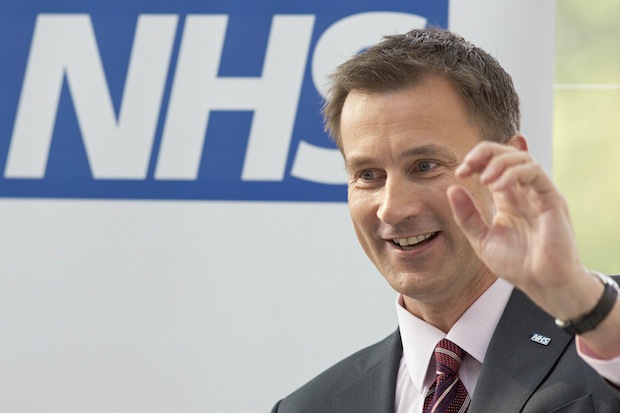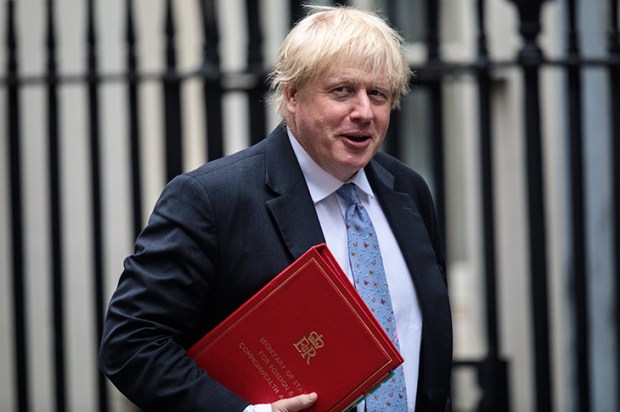Listen
Pinned to the wall of Jeremy Hunt’s office in the Department of Health is an A1 piece of paper detailing that week’s ‘Never Events’. It catalogues the mistakes that have been made in NHS hospitals that should never have happened: people having the wrong leg amputated, swabs being left inside patients after surgery and the like. This grim list is a rebuke to the glib, Danny Boyle-style rhetoric which dominates all political debate about the NHS and treats any attempt to examine the failings of British health care as heresy.
One can’t imagine Andy Burnham, the last Labour health secretary and the shadow secretary of state, approving of Hunt’s decision to display this information so prominently. Earlier this month he accused the Health Secretary of being on a ‘mission to run down the health service’ so that it can be privatised. But Hunt’s decision to have this list up in his office would have been applauded by one of the NHS’s founders, Aneurin Bevan. Given that he wanted the clang of a dropped bedpan to reverberate in Whitehall, Bevan would surely have approved of the Health Secretary’s knowing of the worst mistakes made by the service.
Hunt is about as different personally and politically from Bevan as it is possible to be: he is the son of an admiral, not a coal miner, and a Thatcherite, not a socialist. He does, however, share Bevan’s desire to know what is happening inside every NHS hospital. He begins his day by reading, and replying to, a patient who has written to him about the care that they have received from the NHS.
These letters are behind Hunt’s latest proposal: he wants every patient in hospital to have a named doctor looking after them for their whole stay. His aim is a board above each bed with the name of the doctor who is responsible for this patient for as long as they are in hospital. He believes that this would improve the quality of care by ensuring continuity. It would provide a point of contact for the patient and their family and prevent people from being passed from pillar to post inside hospital. These doctors would then discharge you into the care of a named GP.
This idea is hardly a complicated one. But it is precisely the kind of thing that had fallen by the wayside in an increasingly targets-obsessed NHS where, as the Francis report into what happened at Mid-Staffs revealed, compassion can be lacking. But it will require Hunt to find a way round the European Union’s working time directive which, with its 48-hour working week, would not allow doctors to be responsible for a patient at all times.
The proposal is emblematic of Hunt’s approach as Health Secretary. After the acronym-heavy structural reforms of Andrew Lansley’s tenure, Hunt favours patient-friendly interventions that can be explained in plain English.
Funnily enough, the best way to measure Hunt’s political success is by how far down the political order of battle the NHS is. The Tory leadership reluctantly accepts that it can never win a war with Labour over the health service and that its best hope is to neutralise the issue. If health doesn’t figure prominently in the next election campaign, that will be a boon for the Tories. It was notable that in Cameron’s New Year article setting out his long-term economic plan, health and the NHS were not mentioned.
This is a change from the early years of Cameron’s leadership, when he declared that his priorities could be summed up in three letters: ‘N, H, S.’ Cameron used his commitment to the NHS to prove that he was a different kind of Tory.
But this softly-softly approach, while politically effective — health hardly featured in the 2010 general election campaign — was undermined by the huge reorganisation that Andrew Lansley commissioned on becoming Health Secretary. His reforms had intellectual merit, but they jarred with Cameron’s talk in opposition of no more top-down reorganisations. The problem was compounded by the failure to explain to patients why the changes were needed, or how they would benefit them.
Hunt, by contrast, has tried to talk about everything in terms of patient interest. He is also doing an effective job in reducing the political salience of the issue: there have been half a dozen Prime Minister’s Questions since Miliband last asked Cameron about the health service. Labour, however, still has a commanding 11-point leadon the issue.
But the most important thing that Hunt is doing is bringing glasnost to the NHS. As the Francis report showed, for far too long poor care inside the health service was covered up or ignored. Hunt’s answer to this has been to embrace transparency. He’s introduced a new inspection regime which has already seen almost 10 per cent of hospitals placed in special measures.
These inspection reports should allow a proper discussion about why some hospitals are so much worse than others, a subject that is too often avoided. For a supposedly national service, the variance in quality inside the NHS is shocking. Hunt is trying to address this by making hospitals take more responsibility for their own actions. He has changed the rules so that if in negligence cases they do not admit fault at the earliest opportunity then the hospital itself, not the central NHS, has to pay compensation.
There is more that could be done to support transparency. Charlotte Leslie, who won this magazine’s backbencher of the year award for campaigning for accountability over the Mid-Staffs scandal, thinks that whistleblowers need to be given far more protection. She argues that if they have their claims upheld, they should be offered special assistance when applying for other jobs inside the NHS. Without this, she fears, they risk being penalised for speaking up.
As part of the Tories’ attempt to prevent health becoming an election issue, they are almost certain to commit again to ring-fencing the NHS budget. This promise will be the Tory response when Labour claim they can’t be trusted with the NHS. But the far more important Tory achievement will be to have brought greater transparency to Britain’s health service.
Got something to add? Join the discussion and comment below.
Get 10 issues for just $10
Subscribe to The Spectator Australia today for the next 10 magazine issues, plus full online access, for just $10.
You might disagree with half of it, but you’ll enjoy reading all of it. Try your first month for free, then just $2 a week for the remainder of your first year.















Comments
Don't miss out
Join the conversation with other Spectator Australia readers. Subscribe to leave a comment.
SUBSCRIBEAlready a subscriber? Log in